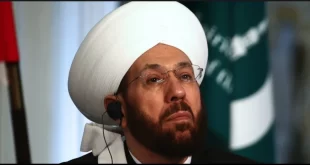by Mohamad Hasan Sweidan, published on The Cradle, April 16, 2025
For decades, Washington has ensured Israel’s military dominance by systematically weakening Arab armies. Lebanon is the most current and obvious example of this doctrine in practice
The US does not merely support Israel – it guarantees the occupation state’s supremacy over the entire region. Since the 1970s, Washington has pursued a deliberate strategy to prevent any Arab state or resistance movement from building military capabilities that could rival those of Tel Aviv. This policy is not rhetorical – it is codified in law and executed across every dimension of US foreign policy in West Asia.
Under the terms of the US Arms Export Control Act, Washington is legally bound to uphold Israel’s “Qualitative Military Edge” (QME), which is defined as:
“The ability to counter and defeat any credible conventional military threat from any individual state or possible coalition of states or from nonstate actors, while sustaining minimal damages and casualties, through the use of superior military means, possessed in sufficient quantity, including weapons, command, control, communication, intelligence, surveillance, and reconnaissance capabilities that in their technical characteristics are superior in capability to those of such other individual or possible coalition of states or nonstate actors.”
In practice, this has translated into the downgrading of arms sales to Arab states, the deliberate postponement or modification of weapons transfers, and the outright sabotage of regional efforts to pursue military independence.
Even Washington’s closest allies are not spared. The UAE’s long-delayed acquisition of F-35 fighter jets – even after signing the Abraham Accords – was conditioned on preserving Israel’s military superiority. When the deal was finally approved, Israel was quietly given a more advanced version of the same aircraft. Similar dynamics have shaped US arms transfers to Egypt and Saudi Arabia, where systems sold are consistently capped or calibrated to preserve the Israeli edge.
Attempts to bypass US control – by procuring weapons from Russia or China – are swiftly punished. Washington imposed sanctions on Turkiye for its purchase of the Russian S-400 missile system, despite Turkiye being a NATO member. The message is consistent across the board: no Arab or regional power, no matter how pro-western, is allowed to develop independent military capacity that could challenge Israeli supremacy.
Lebanon: a textbook example
Nowhere is this policy more visible than in Lebanon, where the post-war political moment is being exploited to push one of Washington’s long-standing demands: the disarmament of Hezbollah. The November 2024 ceasefire between Israel and Lebanon created a new status quo – one in which the US could intensify its campaign under the guise of rebuilding and reconciliation.
The US has framed this disarmament agenda as part of a broader effort to stabilize Lebanon. But the reality is starkly different. Washington’s interest in Lebanon is not sovereignty, nor peace – it is control. It is the erasure of any force capable of resisting Israeli aggression.
On 28 March, US State Department spokesperson Tammy Bruce said:
“As part of the cessation of hostilities agreement, the Government of Lebanon is responsible for disarming Hezbollah, and we expect the Lebanese Armed Forces (LAF) to disarm these terrorists to prevent further hostilities.”
This mischaracterizes the ceasefire terms – none of which include a disarmament clause – but it accurately reflects Washington’s real objective.
No figure has pushed this line more vigorously than Morgan Ortagus, the US deputy envoy to West Asia. In four interviews across regional networks from 6 to 9 March, she referenced the disarmament of Hezbollah 35 times – more than any other topic, including economic reform or border security.
 Ortagus has repeatedly described the current moment as a “once-in-a-generation” opportunity to reconfigure Lebanon’s internal balance of power and has heaped praise on Lebanese President Joseph Aoun and Prime Minister Nawaf Salam for aligning with US priorities. But her praise is highly conditional – anchored in how aggressively the new leadership pursues Hezbollah’s disarmament.
Ortagus has repeatedly described the current moment as a “once-in-a-generation” opportunity to reconfigure Lebanon’s internal balance of power and has heaped praise on Lebanese President Joseph Aoun and Prime Minister Nawaf Salam for aligning with US priorities. But her praise is highly conditional – anchored in how aggressively the new leadership pursues Hezbollah’s disarmament.
Domestically, this pressure campaign has been embraced by Washington’s Lebanese allies. Samir Geagea, leader of the right-wing Lebanese Forces political party, recently dismissed the idea of a national dialogue on Hezbollah’s weapons as “a waste of time,” insisting that disarmament should be implemented immediately. His position aligns more closely with Tel Aviv and directly contradicts President Aoun’s call for a negotiated settlement, “without sparking” another civil war.
Aid with strings attached
Lebanon’s economic collapse has become a powerful tool for coercion. The promise of international assistance – whether from the IMF or the World Bank – is now explicitly tied to disarming Hezbollah. Ortagus has warned repeatedly that Lebanon’s financial rescue hinges on major structural reforms. But those reforms are not economic in nature alone; they are political demands cloaked in fiscal language.
Media reports have confirmed that international financial institutions, under Washington’s direction, have made Hezbollah’s disarmament and moves toward normalization with Israel implicit preconditions for assistance. The message is unambiguous: Lebanon will not receive financial relief unless it surrenders its sovereignty.
Alongside diplomatic and economic pressure, Washington is waging a cognitive war to delegitimize Hezbollah’s role in Lebanese society. This campaign operates through the media, civil society networks, and influence operations that aim to erode Hezbollah’s image as a resistance force and reframe it as a national liability.
This psychological offensive hopes to shift public perception, making the idea of disarmament seem like a path to peace rather than capitulation. But recent polling suggests the campaign is not resonating with the Lebanese public, who can see for themselves that their government is incapable of halting daily Israeli aggressions. A survey by the International Information Center in Beirut found that only 2.7 percent of respondents believed disarmament was the solution to Lebanon’s crisis.
Enabling Israeli aggression
Even as the US demands the resistance be dismantled, it continues to support and enable Israeli military operations in Lebanon. Since the November 2024 ceasefire, Israel has violated Lebanese airspace and territory over 3,000 times. These attacks have resulted in hundreds of casualties and have targeted civilian infrastructure in southern Lebanon and the Beirut suburbs.
Yet every Israeli violation has been met with silence or justification from Washington. When Israel bombed the southern outskirts of Beirut in March—the first such attack since the war ended—Ortagus defended the strike, claiming it was a response to rockets allegedly fired from Lebanon. No evidence was presented, and the source of the fire remains unknown. Still, the US position remained fixed, like a dissonant mantra: Israel’s aggression is self-defense, while Hezbollah’s presence is a threat.
Washington has also authorized Israel to conduct high-altitude flights over Lebanon for intelligence gathering—another blatant violation of Lebanese sovereignty. These flights serve no purpose other than to assert Israeli control over Lebanon’s skies and to assist in future targeting operations.
Suppressing resistance, not just Hezbollah
The campaign against Hezbollah is not just about one party or one armed group. It is part of a systemic strategy to ensure no Arab force – state or non-state – can challenge Israel militarily. Whether in Lebanon, Syria, Jordan, Iraq, or even US-aligned Persian Gulf states, Washington’s goal is the same: disarm, divide, and dominate.
What is happening in Lebanon is not isolated. In Syria, the US has actively worked to prevent the reconstitution of the Syrian Arab Army while undermining the Palestinian cause through the new Islamist-led government.
In Iraq, it has pushed for the marginalization of the Popular Mobilization Units (PMU). In Jordan, it maintains deep intelligence and military influence that effectively curbs any strategic autonomy. Across the board, the result is fragmentation, dependency, and weakness.
Washington’s endgame is neither peace nor democracy. It is to impose a regional order in which the occupation state reigns unchallenged and Arab states are kept in a permanent state of military inferiority.
The tools are varied – diplomacy, economic pressure, information warfare, and military coordination – but the goal is singular: to keep resistance in check and prevent any sovereign power from emerging in West Asia.
This is not just a war on Hezbollah. It is a war on the very idea of resistance, on the right of peoples to defend themselves, define their own security, and chart their own futures. It is a war on identity, sovereignty, and dignity.
The battle cannot be fought on the battlefield alone. It must be waged in the political arena, in economic policy, in media narratives, and in the consciousness of the people. The US wants a region without resistance, without memory, and without self-determination.
But Lebanon is not for sale. And the arms of its resistance will not be surrendered at a table scripted in Tel Aviv and Washington.
 Syria Support Movement solidarity with the Syrian people
Syria Support Movement solidarity with the Syrian people




